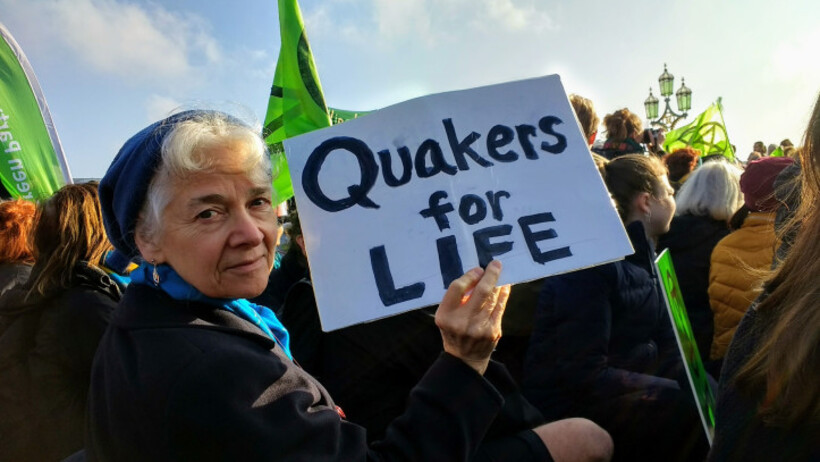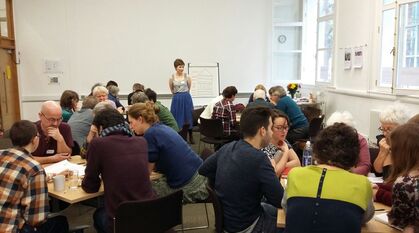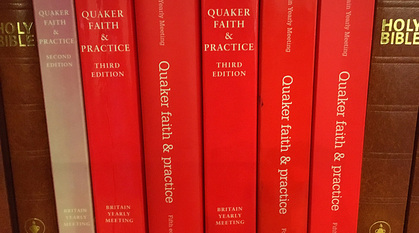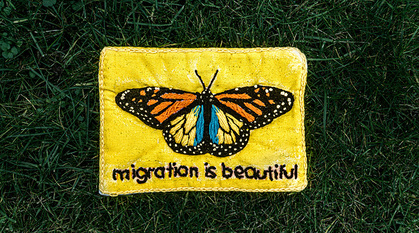Hearing the call of the climate crisis
From Extinction Rebellion to the school strikes, Quakers have been part of a whirlwind of climate action in 2019. Olivia Hanks looks at how we keep up the pressure.

It's been a momentous spring for the climate movement in the UK. Schoolchildren have led climate strikes from school. Extinction Rebellion occupied four major London streets for a week to amplify their demand that the government cut emissions to zero by 2025.
Teenage climate activist Greta Thunberg made headlines with her speech castigating MPs for their "irresponsible behaviour" on the climate crisis. The Committee on Climate Change (CCC) published its advice to government on how to achieve net-zero emissions by 2050. And the UK parliament, the Welsh government and the Scottish First Minister followed numerous local councils in declaring that we are in a climate emergency.
Veteran climate campaigners could be forgiven for feeling a little dazed by the pace of change, following years of struggling to rally people to the cause in the face of government inertia. Many have said they feel hopeful for the first time in years. But protests and declarations are not enough – so what happens now?
Agenda-shaping actions
It is safe to say that Quakers will continue to play a part in this rapidly growing movement. Numerous Quakers were led to participate in the Extinction Rebellion actions in April, with a meeting for worship at Marble Arch attracting well over 100 people. Across the demonstrations in both Edinburgh and London, at least ten Friends blocked roads until they were arrested, feeling led by their "loyalty […] to God's purposes" (Advices & Queries 35). Many others lent their presences, their banner-making skills, and their voices. Read an account of the Edinburgh action from the Quakers involved.
We all have assets we can bring to this movement. At Friends House in London, Quakers in Britain were pleased to be able to offer our largest auditorium for an event with Greta Thunberg, Anna Taylor from the UK Student Climate Network, and Caroline Lucas MP. The following day, we were in the House of Commons to hear Greta tell an audience of MPs that
“we probably don't even have a future any more. Because that future was sold so that a small number of people could make unimaginable amounts of money […]
“We children are not sacrificing our education and our childhood for you to tell us what you consider is politically possible in the society that you have created. We have not taken to the streets for you to take selfies with us, and tell us that you really admire what we do.
“We children are doing this to wake the adults up. We children are doing this for you to put your differences aside and start acting as you would in a crisis. We children are doing this because we want our hopes and dreams back."
Many organisations collaborated to make these two events happen for Greta. As well as Quakers in Britain, the coalition included the UK Student Climate Network, Friends of the Earth, Policy Connect, 10:10 Climate Action, Greenpeace and the office of Caroline Lucas MP. When we work together to make something happen, we can achieve great things.
The policies we need
The advice from the Independent Committee on Climate Change calls for a "whole-government" approach to addressing the climate crisis, rather than making emissions reductions the responsibility of one department. It highlights agriculture, land use, and the decarbonisation of heat as areas where progress has been too slow, and calls for petrol and diesel vehicles to be phased out faster (by 2035 rather than the current aim of 2040).
Importantly, the advice also states that the UK's contribution to cutting emissions "should go beyond what is required for the world overall" because of our high historical emissions and because we are in a strong position to act.
The advice reflects the basic first step that Quakers and climate NGOs have been calling for: update the UK's targets with a clear deadline for reaching net-zero. But as the CCC advice notes, without serious policy changes to match, these targets are meaningless.
While the latest science tells us that the UK must almost certainly reach net-zero much sooner than 2050 to minimise the scale of this global catastrophe, what matters right now is that the CCC report results in rapid policy change and major investment in a just transition.
The time is now
Now that the UK parliament has declared a climate emergency, it's a crucial time to let your MP know you're expecting their actions to match their words. On Wednesday 26 June, Quakers will be joining thousands of others to urge MPs to take bold action on climate change and to protect nature. We'll call on parliament to back a net-zero emissions target, and deliver a deal to protect the UK's precious ecosystems.
In the morning, Quakers will be part of interfaith climate workshops and talks at nearby St Martin-in-the-Fields and Church House. Then at 1pm, we will join hundreds of people outside Parliament to meet our MPs in the streets. To find out more and sign up, please email Philip Wood at philipw@quaker.org.uk.
If you can't join us on the day, you can still write to or meet with your MP. Call on them to back a net-zero emissions target and ask them what they will do to support a just and rapid transition to a sustainable economy.
As the school strikers and Greta Thunberg have been telling us: "Humans are very adaptable: we can still fix this. But the opportunity to do so will not last for long. We must start today. We have no more excuses."


